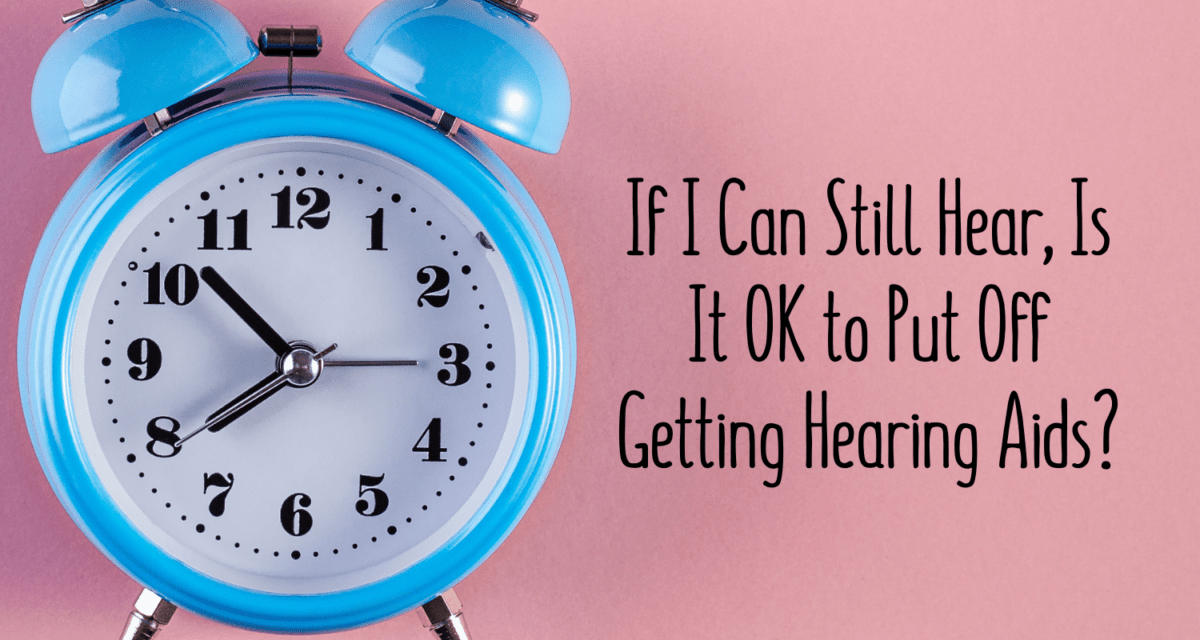For some people, the choice to get hearing aids is easy. As soon as they notice a reduced ability to hear clearly, they are ready and willing to get help. Of course, this assistance can be the most helpful when communicating with others, so many people use the awkward or even embarrassing experience of miscommunication as a nudge to get some help.
However, others look at the question from the opposite perspective. They tend to ask themselves how long they can put off getting hearing assistance. Although they know that hearing aids will be an inevitable need and acknowledge that the process of hearing loss has begun, some of these people would rather put off getting hearing aids as long as possible.
If you or someone you love falls into this category, there are some serious reasons to question the avoidant approach. Not only are hearing aids vastly beneficial for those who have the first signs of hearing loss, but they can actually intervene in a sensory and cognitive process that can be much worse over time. Delaying acquiring hearing aids can actually cause much more damage, so a fast adoption of aids can lead to the best long-term hearing outcomes.
Let’s look at a few of the ways that delaying getting hearing aids can actually make the problem much worse.
Auditory Perception
Although you might be able to hear some sounds, the sensory functions of the brain can be further damaged through under-stimulation. Many people liken the auditory cortex of the brain to a muscle in the body. Of course, the brain is not a muscle, so the analogy does break down at some point.
However, the more you “exercise” this portion of your brain, the better able it is to respond to stimuli and the need for sensory processing. When you hear a sound, a chain reaction is set in motion in your brain, and these nervous systems and cognitive pathways do best when they are actively in use.
On the contrary, when these parts of the brain are under-stimulated, they can actually become less responsive to assistance. Audiologists and hearing health professionals will tell you that those who put off getting hearing aids for a longer time tend to have more trouble adapting to assistance. It is as if the part of their brain that receives that auditory information is struggling to get what it needs and can’t make sense of what it does receive, even when assistance is in place in the form of hearing aids.
Habits and Routines
Another way that putting off getting assistance can actually make the process more difficult is the resistance that some people feel to establishing new habits and routines. As time goes by, it becomes increasingly different to change our behavior patterns. Though it is by no means impossible, it can be difficult to adopt hearing aids into your daily routine.
Similarly, the brain has more trouble using the auditory information it receives when it has spent a long time satisfying a lack of information. The brain tries to make do with what information it does receive, and other parts of the brain can even be recruited to the task. Brain imaging demonstrates that those who have hearing loss tend to use parts of their brain that are normally reserved for complex thought, even for the simple task of listening to a voice. When this recruitment happens, much more serious cognitive problems can emerge, ranging from memory issues and speech discernment to dementia and cognitive dysfunction.
If you or someone you love is putting off getting hearing aids because they are still able to hear, this information should be enough to encourage you to seek assistance as soon as possible. Not only does hearing assistance help improve communication for most users, but it might pave the way for a better likelihood of adopting assistance in the future. The first step is to schedule a hearing test to get a complete diagnosis of your needs and remaining hearing ability. Don’t put off getting your diagnosis any longer; the consequences might be more serious than you think.

